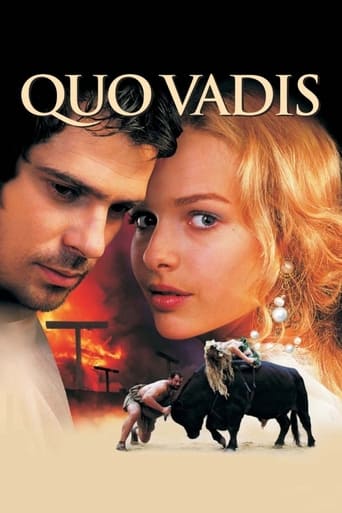Armand
The essential value of this film is the language. In fact, it is a touching tribute in Sienkiewicz memory and every sequence, gesture or word is form of affirmed Polish identity. And it is the best solution to be yourself, after images of Rome in Hollywood vision or Robert Taylor/ Peter Ustinov/ Brandauer acting. So, this "Quo Vadis?" is not beautiful story or fruit of great ambition but a decent movie, inspired by an interesting novel and small search to create an image. Nothing new in this adaptation and nothing touching, except the brilliant beauty of Magdalena Mielcarz and Pawel Delag. In fact, the only charming character is Polish language. At first, for the impact of words with Latin atmosphere. Then for the science to discover the essence of novel, without innovations or original elements."Quo Vadis?' is not another film about Christianism. It is not "The Gladiator". It is only a Polish film, homage to a important writer of a very interesting literature.
muchmalignedmonster
After seeing again Mervyn LeRoy 1951's version of the novel, still memorable in many respects, I venture to watch Kawalerowicz's more recent and supposedly expensive polish film last night. Well man... the movie cannot be more horrible. It's in fact no more than a "TV quality ancient story film", maybe a little worse (oh) thanks to the bad acting ("special" mention to Michal Bajor as Nero), indifferent scenario and horrid direction (could this man be the same who directed long ago the pretentious, but interesting Pharaoh?). A truly waste of money, theirs and mine. And yet, all this said, the movie is redeemed and still watchable mainly for one reason: Rafal Kubacki, proud of showing us the power of a beard and an hairy chest… Not an actor, but a very fine specimen indeed.
denis888
Since I am both Christian and Polish (although with much of the Russian blood), I deeply enjoyed this excellent film. But, you really don't have to be a Pole or a believer to like this work of art. Mr. Kawalerowicz did a marvelous job shooting another masterpiece of Henryk Sienkiewicz. The performance of Boguslaw Linda is as usual impeccable, and the scenes of the Christian martyrdom are simply blood-freezing. You immediately feel deep sorrow when seeing those bloody killings. The bright costumes, excellent actors' work and great plot make this film a must see for all who love to learn more about the history of both Roman Empire and Early Church.
steven-222
Nobel Prize winner Henryk Sienkiewicz is Poland's most revered author; this 2001 adaptation of his world-famous novel is the most expensive movie in Polish history. It's lavish, to be sure, but its real impact comes from the power of its storytelling and the timelessness of its themes.Sienkiewicz was a devout Catholic, and writer/director Jerzy Kawalerowicz's intent is undoubtedly pious — one viewer called QUO VADIS a cross between a Catholic mass and I, CLAUDIUS — but to me, the Christian point of view neither diminishes nor enhances the basic integrity of the story, which is about human beings caught in the maelstrom of Nero's reign. Some, like the pagan Petronius, tread the razor's edge, as must all artists and intellectuals who live under an autocrat (Eisenstein under Stalin comes to mind). Others, like Vinicius and his beloved Lygia, happen to be members of the particular cult which Nero chooses to scapegoat after a fire ravages Rome and destabilizes his regime. This is a tragedy repeated throughout history: when a catastrophe strikes, like the burning of Rome — or the attack on the World Trade Center — the scapegoating impulse of the populace will be exploited by evil men to bring about the death and suffering of innocent people. Whether Christians are the victims or the perpetrators of such scapegoating, it is the duty of history and of art to record the suffering of the innocent — which QUO VADIS achieves, hauntingly and brilliantly.Michal Bajor as Nero surpasses all other screen incarnations of the deranged emperor. Boguslaw Linda plays Petronius, the shrewd survivor, with the multi-layered subtlety the role demands. The other characters are equally well cast, from Judo world champion Rafal Kubacki's towering Ursus to Agnieszka Wagner's blood-chilling Poppaea. Special kudos to Jerzy Trela in the tragicomic role of Chilo Chilonides. The musical score by Oscar-winner Jan Kaczmarek is also memorable.Although QUO VADIS was edited for theatrical release, I saw the original 6-part TV series that's available on DVD from MGE with English subtitles. The pace never flags and the sprawling novel is well suited to serial format.

